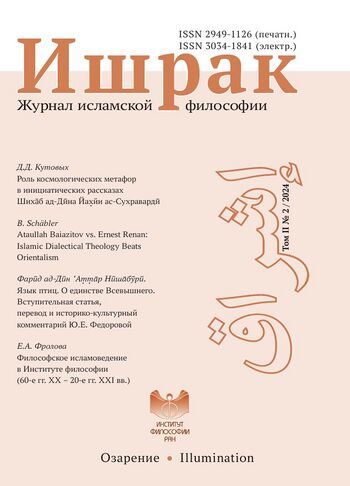Contemporary Reflections on Sadr al-Dīn Šīrāzī’s Transcendent Philosophy: Conditions and Perspectives
| Contemporary Reflections on Sadr al-Dīn Šīrāzī’s Transcendent Philosophy: Conditions and Perspectives |
|---|
 |
| Название статьи: Contemporary Reflections on Sadr al-Dīn Šīrāzī’s Transcendent Philosophy: Conditions and Perspectives |
| Автор: A.A. Mosleh |
| Название научного журнала: Ишрак. Журнал исламской философии |
| Аффилиация: Allameh Tabataba’i University, Tehran, Iran |
| Год издания: 2024 |
| Номер журнала: том II, выпуск 2 |
| Количество страниц: 19 |
| Язык статьи: английский |
| Месть издания: Москва, Россия |
| Ключевые слова: Mullā Sadrā, the Transcendent Philosophy, Islamic Philosophy, Intercultural Philosophy, the Reflexive Interactionist Approach, Modern Islamic Thought |
| Тематика: философияфилософия |
| Вид работы: статья |
Аннотация
The inquiry into the relationship between philosophical thoughts and their era and contexts is a fundamental question. Like all traditions, philosophies are fundamentally shaped by their cultural context and temporal requirements. Without understanding this relationship and without considering how these philosophies relate to the demands of other times, their investigations can lead to misunderstandings and confusion. When revisiting pre/non-modern philosophical traditions, the most important question is how we perceive and refer to them in different circumstances and contexts. Scholars in these fields must first articulate their perception, interpretation, and expectations of such intellectual legacies before any investigation. “The Transcendent Philo sophy or Wisdom” (al-H ̣ ikmah al-muta‘āliyah) of Ṣ adr al-Dīn Šīrāzī (Mullā Ṣ adrā) and its major expositors from the 17th century to the present form the greatest philosophical tradition in Iranian thought and culture. The persistence of such a role raises questions about the status of this tradition in contemporary Iran and the global intellectual sphere. This paper initially describes and critiques three different approaches to the transcendent philosophy or wisdom in Iranian contemporary intellectual history: instrumentalist, authenticist, and reflexive interactionist. It is argued that among these approaches, the third one, deemed suitable for contemporary intellectual conditions, is particularly effective in engaging with this tradition and others like it. Furthermore, it is illustrated that this approach aligns with a recent philosophical paradigm known as intercultural philosophy in a more fundamental analysis.
Выходные данные
A.A. Mosleh. Contemporary Reflections on Sadr al-Dīn Šīrāzī’s Transcendent Philosophy: Conditions and Perspectives // Ишрак. Журнал исламской философии 2024. Т. II. № 2. – М.: ООО «Садра», 2024. – С. 26–44.